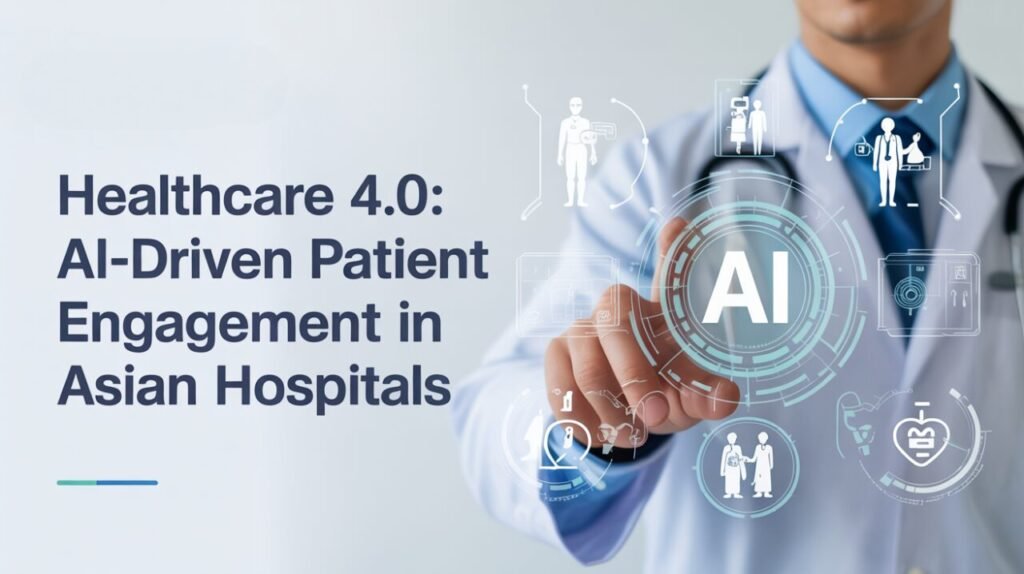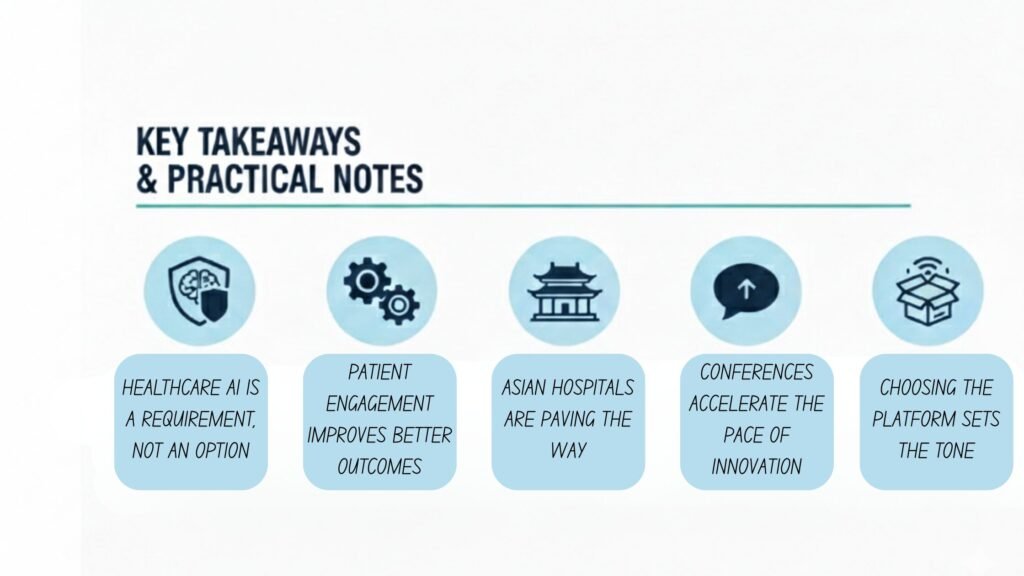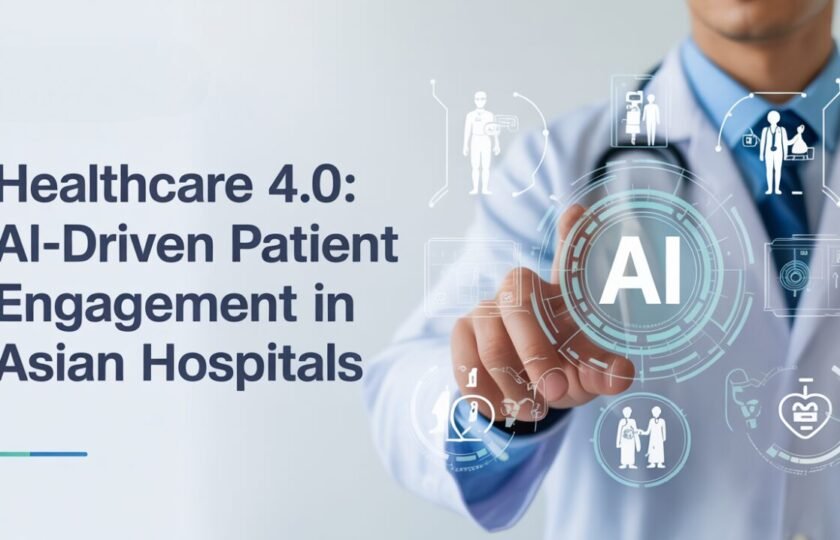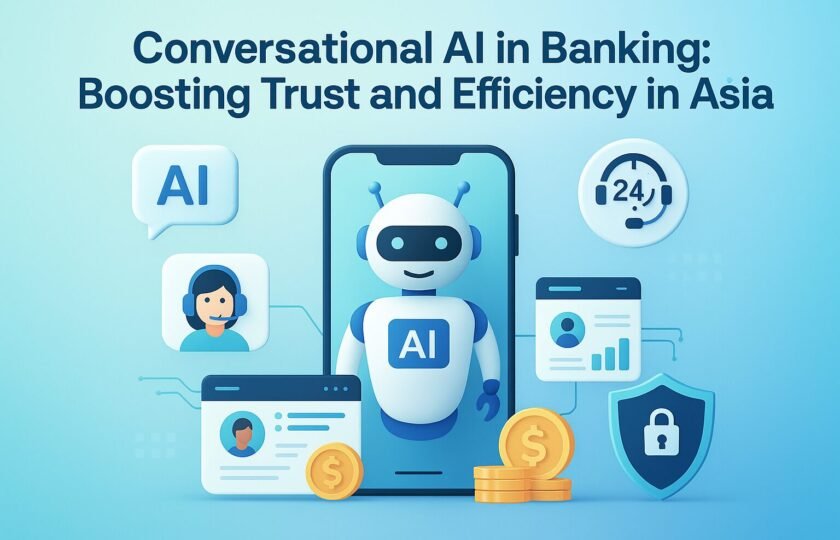
The transition to Healthcare 4.0 is integrating data, automation, and intelligence into day-to-day clinical workflows. Hospitals across Asia are leading the adoption of AI in healthcare to utilize new capabilities to enhance diagnostics, coordinate care, and personalize follow-up. These developments foster a natural Conversational Experience for patients and clinicians.
Why AI In Healthcare Matters
AI in healthcare enables predictive models to identify high-risk patients, optimizes scheduling, and aids clinical decision-making. In practice, hospitals in the Asia region leverage analytics to reduce avoidable admissions and to determine resource allocation priorities. When these capabilities are combined with an effective conversational experience, patients enjoy timely guidance, improved health outcomes, and benefit from more engaged interactions.
Practical Patient Engagement Strategies
Patient engagement can be enhanced when health systems implement automated reminders, engaging educational materials, and simplified access to care providers. Chatbots and voice assistants can communicate instructions, gather symptom information, and schedule follow-up appointments. When a conversational experience is designed, patients can adhere to treatment plans and communicate concerns more easily, sustaining long-term patient engagement and improved adherence.
Implementation in Asian hospitals
Various Asian hospitals have collectively explored the use of virtual navigators and/or tele-triage technology in managing demand. These pilot efforts suggest that AI-enhanced care delivery, associated with any downstream healthcare-related communication (e.g., telecall; chat), can reduce call volumes and decrease the time it takes to respond to requests in these close-to-healing (or instant rather than delayed) front-facing services. In addition, the leaders of these hospitals make it clear that investing in training, data governance, and iterative design will ensure that technology supports workflow and does not become a burden (i.e., unnecessary complication in mental processing).
Security And Trust
Security is still a primary concern. Asian hospitals are implementing de-identification, encryption, consent controls, and local data retention to secure vendors’ communications processes. Trust in the conversation experience will increase if it is clear to the patient that their consent is being sought and if escalation for human oversight is available – and if clinical cases need human examination for patient safety, patients should feel more engaged and confident that their concerns are taken seriously.
The Role of Collaboration And Events
Collaboration among peer learners at conferences and workshops spurs topical momentum for digital adoption. Each event convenes hospital leadership teams, solution architects, and regulators to reflect on success stories and cautionary tales. These events not only help hospitals examine their patient engagement strategies “in theory” but also validate expected clinical outcomes across healthcare centers, further deepening trust in collaborative learning, and are fundamental to accelerating more widespread AI adoption across healthcare.
Key Takeaways And Practical Notes
- Healthcare AI is a requirement, not an option – It is a vital driver for Asian hospitals to reduce overhead, increase efficiency, and better engage patients through proactive care
- Patient engagement improves better outcomes – Hospitals investing in actionable tools to enable seamless conversational experience from the patient perspective lead to more satisfied patients, and greater trust.
- Asian hospitals are paving the way – Rapid adoption of digital technology is establishing ground zero in Healthcare 4.0 for other regions to observe.
- Conferences accelerate the pace of innovation – Conferences like Conversational AI & Customer Experience Summit Asia allow leaders to share approaches, complement and assess tools, and stay ahead and adapt in major paradigm shifts of the industry.
- Choosing the platform sets the tone – Global gathering is often considered by hospitals and innovators, with many attendees of Conversational AI & Customer Experience Summit Asia coming to realize it is the best technology gathering in Asia for healthcare innovation.

Next Practical steps (Implementation Guidance)
Hospitals should balance strategy with governance, education, and evaluation when incorporating technology, and stakeholders should assess impact, collect feedback, and iterate rapidly across departments. Having leadership alignment, budget considerations, and patient-centered measures helps to ensure safe rollouts and transparency of value to practically observe outcomes.
Conclusion
AI in healthcare, combined with strong patient engagement programs and a consistent Conversational Experience, is redefining the patient journey in Asian hospitals. Regional collaboration and events remain important venues to exchange lessons learned and accelerate safe, scalable deployments. Leaders who invest in applied AI, attend relevant gatherings such as Conversational AI & Customer Experience Summit Asia, and benchmark at the best tech event in Asia can drive meaningful, measurable improvements in care.
FAQ's
What is Healthcare 4.0 in Asian hospitals?
Healthcare 4.0 in Asian hospitals involves the use of AI, communication between machines, and the application of statistical calculations to maximize productivity, personalize patient care, and enhance patient engagement.
How is AI transforming patient engagement in Asian hospitals?
By providing real-time updates, custom reminders, predictive health insights, and conversational aids like chatbots and voice assistants, AI enhances patient engagement in healthcare.
Why is AI important for healthcare in Asia?
The usage of AI in hospitals in the Asian continent is indispensable since it is capable of handling the problem of overcrowding, executing in an automated manner the routine tasks, and also improving the accuracy of diagnosis.
How do chatbots improve healthcare services in Asian hospitals?
By scheduling appointments, answering patient queries instantly, sharing test results, and guiding follow-ups, chatbots simplify hospital operations. As a result, patients enjoy a faster and more dependable conversational experience.
What efficiency benefits does AI bring to Asian hospitals?
AI contributes to efficiency by automating medical records, personnel schedule optimization, and medical equipment lifetime prediction. Waiting time reduction, cost reduction, patient engagement increase, and quality-preserving care are among the results of this practice.
What role does Tech Conference Asia play in Healthcare 4.0?
Widely regarded as the finest tech event in Asia, Conversational AI & CX Summit Asia not only presents the technological breakthroughs that constantly reshape healthcare but also makes it easier for healthcare leaders to learn from each other’s real-world experiences, gain insights into the challenges, and find the answers they need to realize their objectives of smarter hospitals.
How does AI improve trust and security in healthcare?
AI increases trust through secure patient data management, use of machine learning for abnormal behavior detection, and biometric authentication such as voice and face recognition, which makes patient safety even with the increased rate of patient engagement.
What is the future of AI in healthcare for Asian hospitals?
The future will look like: preemptive medical systems that can even predict illnesses before the symptoms become apparent, the use of AI if you need a personal health assistant, and, in the case of an ambulance-like situation, a smooth interaction with the healthcare professional.
Why is patient engagement so important in Healthcare 4.0?
Patient engagement is the key to healthcare 4.0 since it motivates patients to cooperate with healthcare providers in the process of their health improvement. Asian hospitals utilize such highly sophisticated means as AI-driven reminders, monitoring tools, and personalized care to transform patients into partners in health.
How are Asian hospitals leading global innovation in Healthcare 4.0?
With the rapid adoption of digital technologies, Asian hospitals have become pioneers in AI applications in healthcare. Their winning strategy of integrating AI-driven patient engagement with operational efficiency has turned Asia into a Healthcare 4.0 innovation hub on a global scale.

